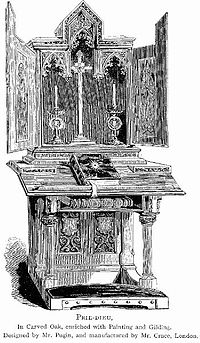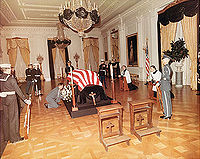Prie-dieu
This article has multiple issues. Please help improve it or discuss these issues on the talk page. (Learn how and when to remove these template messages)
|


A prie-dieu (French: literally, "pray [to] God") is a type of prayer desk primarily intended for private devotional use, but which may also be found in churches. A similar form of chair in domestic furniture is called "prie-dieu" by analogy.[1] Sometimes, a prie-dieu will consist only of the sloped shelf for books without the kneeler.
History
The prie-dieu appears not to have received its present name until the early 17th century. In that period in France, a small room or oratory was sometimes known by the same name.[1] In the Middle Ages, the faithful attended the parish services standing.[2] From the 16th century onwards, wooden benches or chairs were made available, according to an order fixed by the customary law, and rented from the farmer who was the successful bidder for the "chair farm" or from the churchwarden, the fixed prices (increased during solemn masses) being collected by the chairmaker.[3]
Description and use
The design of this prayer stand varied in time, eventually settling[4] as a small, ornamental wooden desk furnished with a thin, sloping shelf for books or hands, and a kneeler.[1] Sometimes, instead of the sloping shelf, a padded arm rest will be provided. This type is useful for devotions such as the Rosary, which do not require a book, or for private, non-liturgical prayer.
Prie-dieu may be provided in church
See also
- Analogion
- Credence table
- Travelling icons
References
- ^ a b c Chisholm 1911, p. 316.
- JSTOR 40069344.
- ISSN 0048-8003.
- ^ Boger & Boger 1957.
Sources
- This article incorporates text from a publication now in the public domain: Chisholm, Hugh, ed. (1911). "Prie-dieu". Encyclopædia Britannica. Vol. 22 (11th ed.). Cambridge University Press. p. 316.
- Boger, Louise Ade; Boger, H. Batterson, eds. (1957). "Prie-Dieu". The Dictionary of Antiques and the Decorative Arts: A Book of Reference for Glass, Furniture, Ceramics, Silver, Periods, Styles, Technical Terms, Etc. Scribner. p. 378. OCLC 1019976310.
External links
